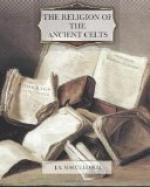Math or Math Hen, “the Ancient,"[367] is probably an old divinity of Gwyned, of which he is called lord. He is a king and a magician, pre-eminent in wizardry, which he teaches to Gwydion, and in a Triad he is called one of the great men of magic and metamorphosis of Britain.[368] More important are his traits of goodness to the suffering, and justice with no trace of vengeance to the wrong-doer. Whether these are derived from his character as a god or from the Celtic kingly ideal, it is impossible to say, though the former is by no means unlikely. Possibly his supreme magical powers make him the equivalent of the Irish “god of Druidism,” but this is uncertain, since all gods were more or less dowered with these.
Gwydion’s magical powers are abundantly illustrated in the tale. At Pryderi’s court he changes fungus into horses and dogs, and afterwards slays Pryderi by power of enchantments; he produces a fleet by magic before Arianrhod’s castle; with Math’s help he forms Blodeuwedd out of flowers; he gives Llew his natural shape when he finds him as a wasted eagle on a tree, his flesh and the worms breeding in it dropping from him; he transforms the faithless Blodeuwedd into an owl. Some of these and other deeds are referred to in the Taliesin poems, while Taliesin describes himself as enchanted by Gwydion.[369] In the Triads he is one of the three great astrologers of Prydein, and this emphasis laid on his powers of divination is significant when it is considered that his name may be derived from a root vet, giving words meaning “saying” or “poetry,” while cognate words are Irish faith, “a prophet” or “poet,” German wuth, “rage,” and the name of Odinn.[370] The name is suggestive of the ecstasy of inspiration producing prophetic and poetic utterance. In the Mabinogion he is a mighty bard, and in a poem, he, under the name of Gweir, is imprisoned in the Other-world, and there becomes a bard, thus receiving inspiration from the gods’ land.[371] He is the ideal faith—diviner, prophet, and poet, and thus the god of those professing these arts. Strabo describes how the Celtic vates (faith) was also a philosopher, and this character is given in a poem to Seon (probably = Gwydion), whose artists are poets and magicians.[372] But he is also a culture-god, bringing swine to men from the gods’ land. For though Pryderi is described as a mortal who has himself received the swine from Annwfn (Elysium), there is no doubt that he himself was a lord of Annwfn, and it was probably on account of Gwydion’s theft from Annwfn that he, as Gweir, was imprisoned there “through the messenger of Pwyll and Pryderi."[373] A raid is here made directly on the god’s land for the benefit of men, and it is unsuccessful, but in the Mabinogi a different version of the raid is told. Perhaps Gwydion also brought kine from Annwfn, since he is called one of the three herds of Britain,[374] while he himself may once have been an animal god, then an anthropomorphic deity associated with animals. Thus in the Mabinogi, when Gwydion flees with the swine, he rests each night at a place one of the syllables of which is Moch, “swine”—an aetiological myth explaining why places which were once sites of the cult of a swine-god, afterwards worshipped as Gwydion, were so called.




